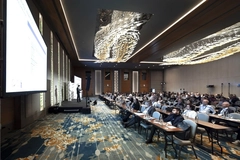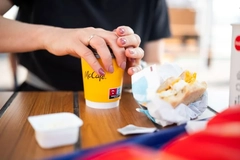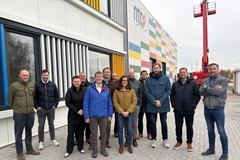New swingover system a turning point
20 Dec 2011

Now, with construction on his new 22-unit swingover dairy complete, Michael is looking forward to better efficiency in his enterprise. Built by Dairy Tech South East, the new dairy features a brand new Westfalia milking system with the exception of the cups and plate cooler.
FOR Kongorong dairyfarmer Michael Leese, a long-time plan has come to fruition. When he moved to Kongorong from Narrung four years ago, he converted the eight-unit herringbone swingover on the property into a 10-unit double-up herringbone before bringing in the milking herd.
But milking more than 200 cows twice a day meant he was still spending seven to eight hours each day in the dairy. The yard was too small to hold the entire herd and half of them were left standing out in the laneway.
"The goal, the whole time, was to build a new dairy and give myself more of a life," he said.
"Jobs that needed to be done, like fencing and other general on-farm maintenance, weren't getting done. There is only so much you can do in a day."
Now, with construction on his new 22-unit swingover dairy complete, Michael is looking forward to better efficiency in his enterprise. Built by Dairy Tech South East, the new dairy features a brand new Westfalia milking system with the exception of the cups and plate cooler.
The Feedtech feed system was bought second-hand as was the 12,050-litre Westfalia milk vat that could earlier hold only 8000L.
Michael said he went with the swingover option because of labour efficiencies and cost savings.
"It's a dairy I can milk in by myself," he said.
"I looked at different systems on the internet and got a few ideas from other dairyfarmers, but it really only firmed up my beliefs to get a swingover."
Michael said the flow was "excellent" and the cows seemed more content with the new dairy.
"Now the cows graze out in the paddock for longer instead of standing on concrete waiting to be milked," he said.
Milking times have been cut drastically - it now takes 85 minutes to milk 200 cows, with each making 29L and annual production touching 1.8m.
Efficiency is a major goal for the farm and the only other labour Michael allows for are exchange students who come through every year.
The cows get fed a six-kilogram ration of triticale and lupins a day in the bale - milled and mixed by Michael and sourced from a local merchant - before they head out to clover and ryegrass pastures during the day or night.
Michael makes his own silage on the 161-hectare property, 58ha of which is under irrigation.
He said while it was a tough decision to move from Narrung to Meningie at the time, he had no choice given the drought and receding water levels on the Lower Lakes.
It was the genetics side of dairying that he most wanted to keep going.
Established by his parents Joe and Lorraine in 1977, Jolrae Holsteins held a lot of history which Michael was keen to expand on.
"I wanted to keep milking and keep the genetics going," he said.
"My parents gave me a start with the cows, so the least I could do was continue with the stud.
"I did have lifelong plans for the farm at Narrung early in 2007. A bigger water license was bought to expand and develop the property but it was disappointing to see the project fall through because of water problems.
"But in hindsight, we are fortunate no money was spent on infrastructure."
Source: Westfalia
All content and features on this website are copyrighted with all rights reserved. The full details can be found in our privacy statement
Subscribe to our newsletters
By continuing to browse our site you agree to our Privacy Statement











